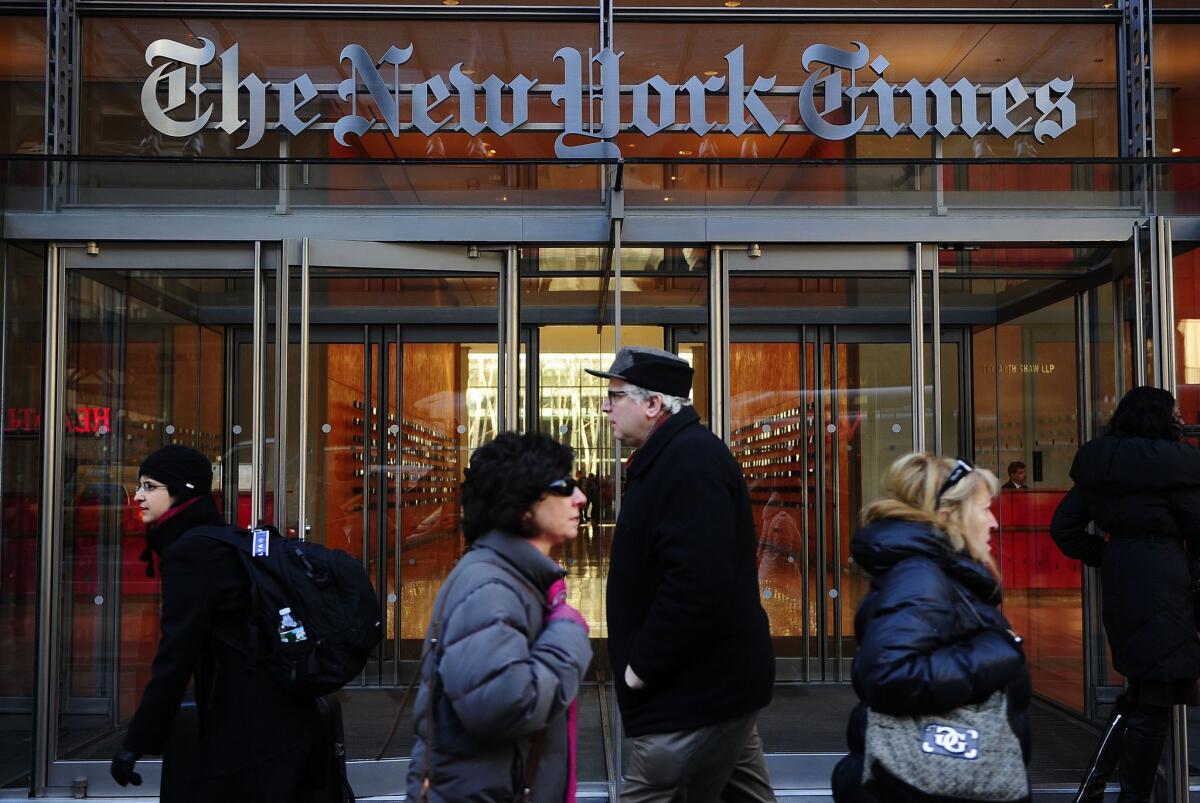New York Times writers condemn decision to run senator’s op-ed calling for military mobilization

- Share via
Demonstrations for the civil rights of black Americans that have gripped the country in recent days have spilled into the corridors of the New York Times, as writers protested the publication of an opinion piece calling for the military to be brought in to quell the unrest.
Writers from across the news organization — including its style section, film team, technology reporters and contributors as well as a former public editor — have blasted the decision of opinion page editor James Bennet to run the op-ed by Sen. Tom Cotton (R-Ark.).
These writers and others at the Times tweeted “Running this puts black @NYT staff in danger” above a screenshot of the piece. Other journalists and former New York Times staffers joined in. A spokesperson for the Times did not return requests for comment.
In the inflammatory piece published Wednesday, Cotton said “some elites” had excused an “orgy of violence in the spirit of radical chic” in the wake of the police killing of George Floyd, excuses he said were based on “a revolting moral equivalence of rioters and looters to peaceful, law-abiding protesters.” He called for the use of the Insurrection Act, which authorizes the president to deploy the military “or any other means” in “cases of insurrection, or obstruction to the laws,” to restore order.
“I’ll probably get in trouble for this, but to not say something would be immoral,” responded Nikole Hannah-Jones, who was awarded this year’s Pulitzer Prize for commentary for the 1619 Project, the New York Times’ exploration into the role of black Americans in U.S. history starting with the arrival of the first enslaved Africans in 1619. “As a black woman, as a journalist, as an American, I am deeply ashamed that we ran this.”
The NewsGuild of New York, of which the New York Times’ newsroom union is a part, expressed concern over the move to publish Cotton’s piece, saying it “poured gasoline on the fire.”
Bennet took to Twitter to defend his decision: “The Times editorial board has forcefully defended the protests as patriotic and criticized the use of force, saying earlier today that police too often have ‘responded with more violence — against protesters, journalists and bystanders.’ We’ve also crusaded for years against the underlying, systemic cruelties that led to these protests.
“As part of our explorations of these issues, Times Opinion has published powerful arguments supporting protests, advocating fundamental change and criticizing police abuses,” Bennet added. “Times Opinion owes it to our readers to show them counter-arguments, particularly those made by people in a position to set policy. We understand that many readers find Senator Cotton’s argument painful, even dangerous. We believe that is one reason it requires public scrutiny and debate.”
The outcry by the New York Times’ writers is one of the most visible and proactive protests by staffers at the paper in recent years and the latest in a series of controversies involving the opinion pages since Bennet was hired in 2016.
The New York Times and its staff are often a target for President Trump and his conservative allies; the president regularly describes the profitable, award-winning newspaper as “failing.”
Under Bennet, the paper’s opinion pages have brought in the views of more conservative writers, including columnist Bret Stephens and editor and writer Bari Weiss.
Stephens, a former deputy editorial page editor at the Wall Street Journal, was hired in 2017 in a move to “broaden the range of Times debate about consequential questions.”
But his columns on climate science and other topics have drawn a backlash from readers. In December, the paper published an editor’s note over a Stephens column titled “The Secrets of Jewish Genius,” disclosing that it had cited a study by an author with a history of making racist statements. Stephens said that at the time he didn’t know the study promoted racist views and was not endorsing it.
The decision to publish pieces by such as figures as Russian President Vladimir Putin and Erik Prince, who founded the private military company formerly known as Blackwater, also stirred controversy.
Bennet has also brought on new liberal voices, including Jamelle Bouie and Michelle Goldberg.
The employee protests at the New York Times came during a week when workers at Facebook publicly criticized their company for Chief Executive Mark Zuckerberg’s decision not to take action when Trump shared a post including the phrase “when the looting starts, the shooting starts.”
More to Read
Inside the business of entertainment
The Wide Shot brings you news, analysis and insights on everything from streaming wars to production — and what it all means for the future.
You may occasionally receive promotional content from the Los Angeles Times.











